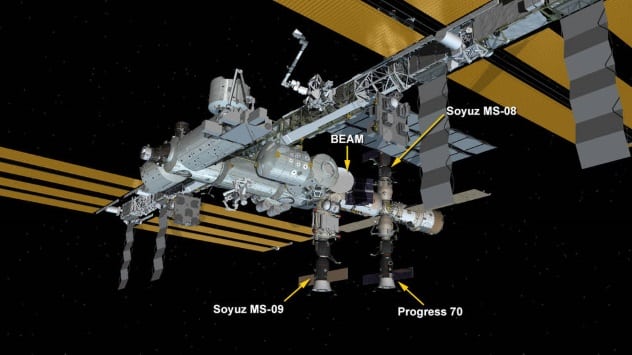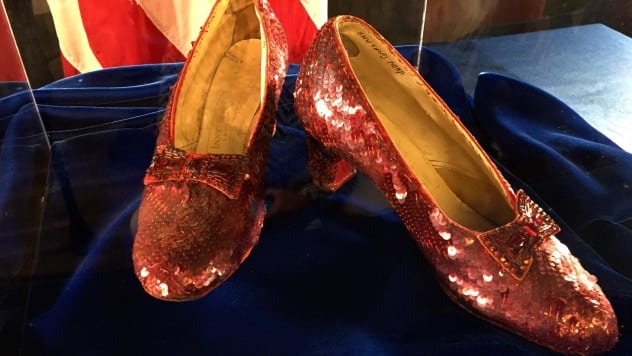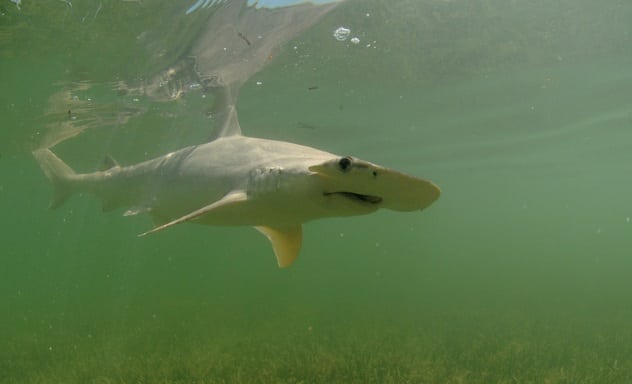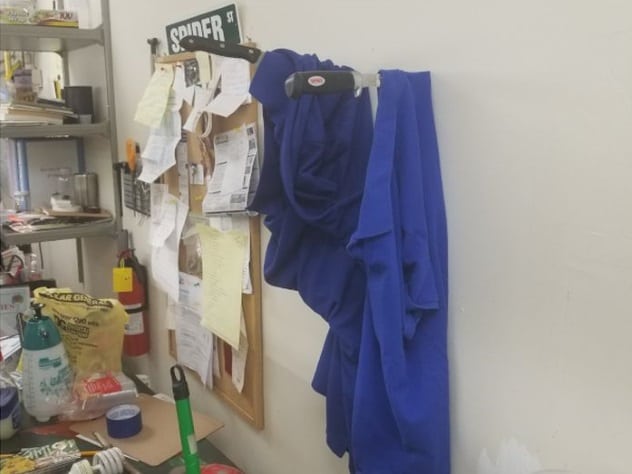We have a multifarious collection of news items today. There’s pole dancing in China, a ghost ship in Myanmar, and a giant penis on an English hillside. We make an amazing discovery about sharks and explore some trouble aboard the ISS. We also take a look at two peculiar heists—one which just occurred and one that was solved after 13 years.
10 Astronaut Plugs Hole With Finger
Astronauts aboard the International Space Station faced potential peril last week when they discovered that a leak somewhere on the station was causing the air pressure to drop. Fortunately, the hole was small enough that one of the astronauts simply plugged it with his finger. The leak was first detected by NASA ground crews while everyone aboard the ISS was sleeping. The next morning, the first order of business was finding the breach. They located the 2-millimeter-wide hole in the orbital section of Soyuz spacecraft MS-09.[1] It was initially believed to have been caused by a micrometeorite hitting the ISS with enough force to punch through the wall, but it was later found to have been drilled. Whether it was deliberate sabotage or human error is up for debate. German astronaut Alexander Gerst stopped the air pressure from dropping by plugging the leak with his finger. Obviously, this was only a temporary measure while a more permanent solution was devised, not that the lasting resolution was significantly more high-tech. In the end, astronauts used epoxy and high-strength tape to seal the hole. So far, it is working, but they are still looking into something more reliable for the foreseeable future.
9 LSD On Trial
The first ever LSD microdosing trials started this week to see what benefits, if any, this method of consumption has. As its name suggests, microdosing involves taking very small doses of the drug, as little as one-fifteenth of a tab. It is said that this technique eliminates all hallucinogenic effects but helps with focus and depression. It has become a popular aid in the digital world of Silicon Valley. However, the method has never been tested scientifically, so all reports of benefits and side effects are anecdotal. On September 3, though, a placebo-controlled trial started at Imperial College London, sponsored by the Beckley Foundation, an organization founded to advance research into mind-altering substances.[2] There’s just one problem—taking LSD is still illegal, no matter the dose. Therefore, researchers had to adopt a less conventional approach by inviting people who already microdose to join a “self-blinded study.” In other words, participants will be providing their own drugs which they will be inserting into some gel capsules while leaving others empty to serve as the control. Then they will take doses regularly without knowing if they are consuming LSD or a placebo. Afterward, the test subjects will participate in online questionnaires and cognitive games to see what effects the drug has. The research team will know which capsules have LSD inside through QR codes and will tally the results after four weeks of testing.
8 The Ghost Ship Of Yangon
A curious sight occurred in the city of Yangon in Myanmar last week when a giant “ghost ship” was found drifting near its shore. The mystery was put to rest on Saturday when the vessel was identified as the Sam Ratulangi PB 1600, an Indonesian freighter headed for Bangladesh. There were no crew members or goods aboard the ship. Myanmar navy officials believed it had been towed after finding two cables at the head. An investigation eventually found an Indonesian tugboat called Independence about 80 kilometers (50 mi) away. What started off as an intriguing, even spooky mystery had a mundane explanation. The tugboat had been towing the freighter since August 13. They were headed for a ship-breaking factory in Bangladesh, but bad weather caused a cable to break.[3] They then decided to simply abandon it.
7 Going Up
We are getting one step closer to a space elevator this month, as Japanese scientists will test a miniature version as proof of concept. Researchers from Shizuoka University are planning to send up an elevator stand-in box measuring 6 centimeters (2.4 in) long, 3 centimeters (1.2 in) wide, and 3 centimeters high. Unlike a regular space elevator, this one will be launched into space using a rocket. It will also be joined by two miniature satellites which will be connected together using a 10-meter-long (33 ft) steel cable. The motorized box will travel between the two satellites on the cable, acting as a substitute for an elevator car. Its short journey will be recorded and transmitted back to Earth. The main goal here is to see how a container connected to a cable moves through space.[4] The mission is set to launch on September 11 from the Tanegashima Space Center in Kagoshima. There are many obstacles left before a real space elevator becomes a reality. However, the significant reduction in risks and costs is pushing development ever further. The university’s collaborator and adviser, Japanese construction giant Obayashi Corporation, is working on its own space elevator, which should be ready by 2050. Such a device is expected to reduce the costs of transporting cargo from $22,000 per kilogram via shuttle to just $200.
6 Whiskey In The Jar
This autumn, whiskey enthusiasts will be able to enjoy a new spirit called “Blackened,” courtesy of heavy metal icons Metallica. The drink’s unique flavor has been “shaped” using a special “sonic enhancement” process called “Black Noise.” In other words, the whiskey has been blasted with Metallica songs during the distilling process. The band’s heavy bass lines were played through a subwoofer next to the aging barrels. The powerful low-hertz sound waves are meant to disrupt the whiskey on a molecular level, leading to “increased wood interaction that kicks up the wood-flavor characteristics.”[5] Different playlists were created for each batch. The whiskey was devised by members of the band in conjunction with master distiller Dave Pickerell. It is a blend of various bourbons, ryes, and other whiskeys, which are aged in black brandy barrels during their final stages. It will sell for around $50 a bottle.
5 Pole Dancing For Kindergarteners
The headmaster of a kindergarten in China landed in hot water after hiring a pole dancer to entertain pupils and parents during the welcome ceremony.[6] The Xinshahui Kindergarten in Shenzen opened its doors on September 3 and invited families to attend the festivities. Part of the entertainment included multiple women performing in skimpy outfits and, among them, even a pole dancer. She grooved to “Buttons” by the Pussycat Dolls while swinging from a flagpole bearing the Chinese flag. Footage of the performance made its way to Chinese social media platforms such as Sina Weibo, where parents expressed anger and incredulity at the school board for scheduling such an event. Several parents claimed to have withdrawn their children from the school. The local Bao’an Education Bureau launched an investigation following numerous complaints and concluded that the actions were “not appropriate.” The headmaster has been dismissed and the school ordered to apologize. In a statement distributed to the parents, school officials claimed the goal was to “expose the children to a wider range of dances.”
4 There’s No Place Like Home
The FBI announced the recovery of a valuable piece of Hollywood memorabilia—a pair of ruby slippers worn by Dorothy in The Wizard of Oz. The shoes were stolen 13 years ago from the Judy Garland Museum in her hometown of Grand Rapids, Minnesota.[7] The owner of the ruby slippers, Michael Shaw, purchased them in 1970 for $2,000. The shoes were on loan to the museum at the time when they were stolen. The thief simply swiped the footwear, broke the glass of an emergency exit door, and made a run for it. So far, the FBI hasn’t provided details on how they identified the criminal and recovered the stolen memorabilia. Even though there are three other pairs of ruby slippers in existence, they are still worth a lot of money. The last pair sold at a private auction went for $2 million. Shaw said the insurance company paid out $800,000 for the stolen shoes, so they own them now, although he has the right to buy them back.
3 The Bicycle That Became A Penis
The residents of Ilfracombe, Devon, woke up Tuesday morning to find that pranksters had turned the giant cardboard bicycle sitting on Capstone Hill into a giant cardboard penis. The original artwork was created to celebrate stage two of the ongoing Tour of Britain.[8] Made from recycled materials, it was also meant to highlight the work of Plastic Free North Devon, an organization that makes efforts to keep the beaches clean and minimize the impact of single-use plastics. During the night, cheeky rogues altered the cardboard creation into something more phallic. However, the original artists weren’t too bothered about it. In fact, project coordinator Seth Conway saw the funny side and was even glad for all the extra attention garnered by the stunt.
2 The First Omnivorous Shark
The bonnethead has been identified as the first known species of shark that is an omnivore. According to US researchers, up to 60 percent of the animal’s diet is made up of seagrass.[9] A common type of hammerhead shark, the bonnethead is found in many waters, including the Pacific, the Gulf of Mexico, and the Western Atlantic. Up until this point, experts believed that the shark dined exclusively on crustaceans, mollusks, and bony fish. However, scientists at the University of California in Irvine and the Florida International University in Miami decided to study the bonnethead’s eating habits more closely after reports of the shark chomping on seagrass beds in the waters off the coast. It was believed that the eating of seagrass was incidental and provided no nutritional value. To test this out, scientists grew their own seagrass in the lab. However, they added sodium bicarbonate powder made with a certain carbon isotope to give the plants a distinct chemical fingerprint. Afterward, they fed five bonnethead sharks on a diet of seagrass and squid. After three weeks of testing, all the fish put on weight. Moreover, their stomachs were able to digest the plants. High levels of the isotope were found in the sharks’ blood and liver, showing that the bonnethead used seagrass to power and maintain its body.
1 The Insect Heist Of The Century
One of the largest insect heists in history took place as thieves robbed the Philadelphia Insectarium and Butterfly Pavilion and made off with over 7,000 live spiders, scorpions, and other creepy-crawlies. Eighty different species of arthropods were stolen. The criminals cleaned out over 80 percent of the museum’s collection. The heist occurred in late August, and it seemed to be an inside job. Security footage shows some of the employees carrying boxes of insects and arachnids out of the Insectarium over several days. When they were finished, the thieves left their blue uniforms stuck to a wall with knives. Even though authorities know the identities of some of the robbers, no arrests have been made yet. They recovered about a dozen insects from the home of a suspect, but thousands of others remain unaccounted for. The motive for the heist seems to be financial. The stolen critters are worth around $40,000.[10] According to Insectarium owner John Cambridge, they are easy to sell and are popular on the exotic pets market. This also means that the chances of retrieving the arthropods are very slim. The Philadelphia Insectarium has only been opened for a year and now has had to close down its second and third floors while Cambridge attempts to rebuild his collection. However, since news of the theft spread, various institutions and private collectors have donated specimens to help out a fellow bug enthusiast.
























